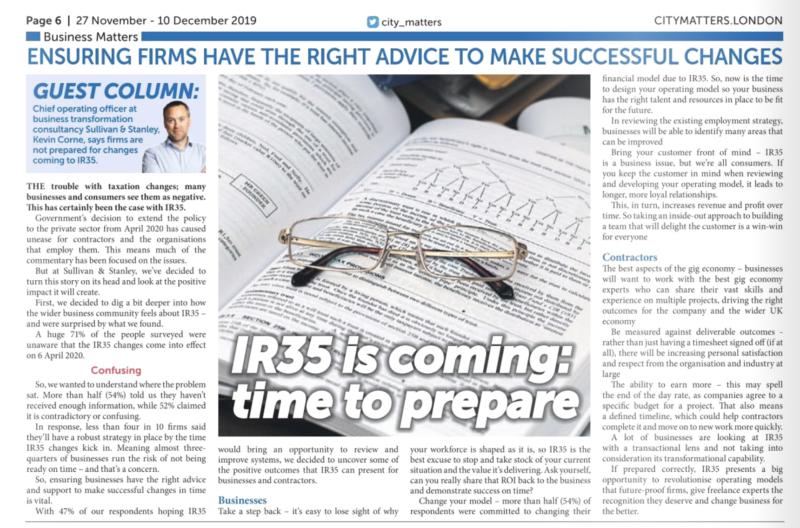Our Chief Operating Officer Kevin Corne wrote a guest column for City Matters on all things IR35. Check it out below…

IR35 is coming: it’s time to prepare
The trouble with taxation changes; many businesses and consumers see them as negative. This has certainly been the case with IR35.
The Government’s decision to extend the policy to the private sector from April 2020 has caused unease for contractors and the organisations that employ them. This means much of the commentary has been focused on the issues. But at Sullivan & Stanley, we’ve decided to turn this story on its head and look at the positive impact it will create.
First, we decided to dig a bit deeper into how the wider business community feels about IR35 – and were surprised by what we found.
A huge 71% of the people surveyed were unaware that the IR35 changes come into effect on April 6, 2020. So, we wanted to understand where the problem sat. More than half (54%) told us they haven’t received enough information, while 52% claimed it is contradictory or confusing.
In response, less than four in ten firms said they’ll have a robust strategy in place by the time IR35 changes kick in. Meaning almost three-quarters of businesses run the risk of not being ready on time – and that’s a concern.
So, ensuring businesses have the right advice and support to make successful changes in time is vital. With 47% of our respondents hoping IR35 would bring an opportunity to review and improve systems, we decided to uncover some of the positive outcomes that IR35 can present for businesses and contractors.
Businesses
- Take a step back – it’s easy to lose sight of why your workforce is shaped as it is, so IR35 is the best excuse to stop and take stock of your current situation and the value it’s delivering. Ask yourself, can you really share that ROI back to the business and demonstrate success on time?
- Change your model – more than half (54%) of respondents were committed to changing their financial model due to IR35. So, now is the time to design your operating model so your business has the right talent and resources in place to be fit for the future. In reviewing the existing employment strategy, businesses will be able to identify many areas that can be improved
- Bring your customer front of mind – IR35 is a business issue, but we’re all consumers. If you keep the customer in mind when reviewing and developing your operating model, it leads to longer, more loyal relationships. This, in turn, increases revenue and profit over time. So taking an inside-out approach to building a team that will delight the customer is a win-win for everyone
Contractors
- The best aspects of the gig economy – businesses will want to work with the best gig economy experts who can share their vast skills and experience on multiple projects, driving the right outcomes for the company and the wider UK economy
- Be measured against deliverable outcomes – rather than just having a timesheet signed off (if at all), there will be increasing personal satisfaction and respect from the organisation and industry at large
- The ability to earn more – this may spell the end of the day rate, as companies agree to a specific budget for a project. That also means a defined timeline, which could help contractors complete it and move on to new work more quickly
A lot of businesses are looking at IR35 with a transactional lens and not taking into consideration its transformational capability. If prepared correctly, IR35 presents a big opportunity to revolutionise operating models that future-proof firms, give freelance experts the recognition they deserve and change business for the better.





































































